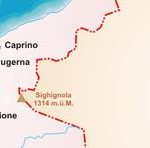Burning Library: Galen in Chinese Shorthand August 10, 2016
Author: Beach Combing | in : Ancient, Medieval
The Arab writer Ibn al-Nadim included this extraordinary record of contact between east and west in his Index of the Sciences, finished in 988. He is reporting an encounter between a Chinese student, visiting Baghdad, al-Razi, perhaps the greatest of the Persian writers of the golden age, and the writings of Galen, the greatest Mediterranean […]
Clearing Minefields with Human Beings November 13, 2015
Author: Beach Combing | in : Contemporary
So a hundred infantry have to get across a field to their objective and safety, only they know that the field has been planted with mines. How do you clear the field? The simplest (and most horrible) thing to do would be to send your troops forward down a plotted route with gaps of ten […]
Killed by a Watermelon? Royal Iranian Caprices… June 12, 2015
Author: Beach Combing | in : Modern
Even by the standards of oriental despots Mohammad Khan Qajar was a pretty nasty piece of work. He had himself survived as a young man because the then ruler of Persia had decided only to castrate MKQ instead of having him killed, a decision he would soon regret. MKQ was not apparently a sadist. But […]
Fighting Sea Monsters with Vinegar in Medieval Iran December 28, 2014
Author: Beach Combing | in : Medieval
One of the joys of ancient and medieval geographies are the small ethnographic details that sound strange, but that might just possibly be based on fact. The following comes from the works of Chang De, a thirteenth century ambassador and informant for a famous Chinese work, The Record of an Embassy to the Regions of […]
Do You Recognise Iskandar? November 2, 2014
Author: Beach Combing | in : Ancient, Medieval
There is always a pleasure in seeing what an almighty mess humans can make of ‘historical’ traditions. Take the following story about someone who is known by every reader of this blog, but who has arrived here, some fifteen hundred years after his death, in a guise that is not (ahem) particularly reminiscent of the historical […]
The Poison Duel 4#: The Medical Origins of the Poison Duel? September 23, 2014
Author: Beach Combing | in : Medieval, Modern
The earliest nineteenth-century poison duel seems to have been that almost fought in 1821 in Virginia. However, there are pre-nineteenth-century records and strangely they concern doctors. The earliest record anywhere that Beach has been able to dig up was an alleged reference in the Iranian poet Nizami (obit 1209). Nizami in one poem (Treasury of […]
Telegraph Wire and Oasis Jewellery May 15, 2014
Author: Beach Combing | in : Modern
Governments and multi-nationals have long had problems with locals (particularly criminally-inclined locals) stealing their wire. Most collectors get out their pliers because, say, copper is worth a lot of money. But in the early years of electricity and telegraph wire there were other reasons for stealing: more principled and practical reasons. Take Thomas Stevens’ description […]
Death’s Fluttering Wings: Photos November 9, 2013
Author: Beach Combing | in : Actualite, Contemporary
A bit of a melancholy day and so Strange History offers a post on death: a series of pictures of people about to die. The only condition is that the photographs must not be excessively upsetting or morbid. This means that most of the people here, in fact, do not know that they are about […]
The Wessel Coins #3: Kilwa and its Sultanate July 27, 2013
Author: Beach Combing | in : Contemporary, Medieval, Modern
Kilwa (or Quiloa as it was often called in European sources) was a small almost-tidal island off the coast of Tanzania. ‘Almost tidal’ because in its early history there was allegedly a causeway and even in later centuries it was possible to wade to Kilwa at low tide. The city of Kilwa was a […]
Reds and Blues in the Persian Gulf February 9, 2013
Author: Beach Combing | in : Contemporary
Paul K. Van Riper was one of the most notable American warleaders of his generation. A marine commander who earned a reputation for fighting from the front in Vietnam, he finally retired as lieutenant general, 1 October 1997. Then, 24 July 2002, Rip (as he is know to his friends) went rogue and killed 20,000 […]
Exclaves! June 4, 2012
Author: Beach Combing | in : Actualite, Contemporary, Modern
A strange post today – just for a change… Beach has recently been troubled by the Kaliningrad Oblast, a peculiar bit of Russian territory that stands several hundred kilometres to the west of the Russian frontiers. Now an exclave of Russian life on the borders of Poland and Lithuania, Kalingrad would be just the kind […]
Immortal Meals 6#: Arguments at Tehran October 19, 2011
Author: Beach Combing | in : Contemporary
WIBT (Wish I’d been there) moments from the Big Three Conference at Tehran in 1943 are so numerous that a casual reader would be spoilt for choice: Marshal Voroshilov dropping the Sword of Stalingrad at the worst possible moment in the ceremonials; German intelligence’s attempts to kill Churchill, Roosevelt and Stalin; agreement on the United […]



